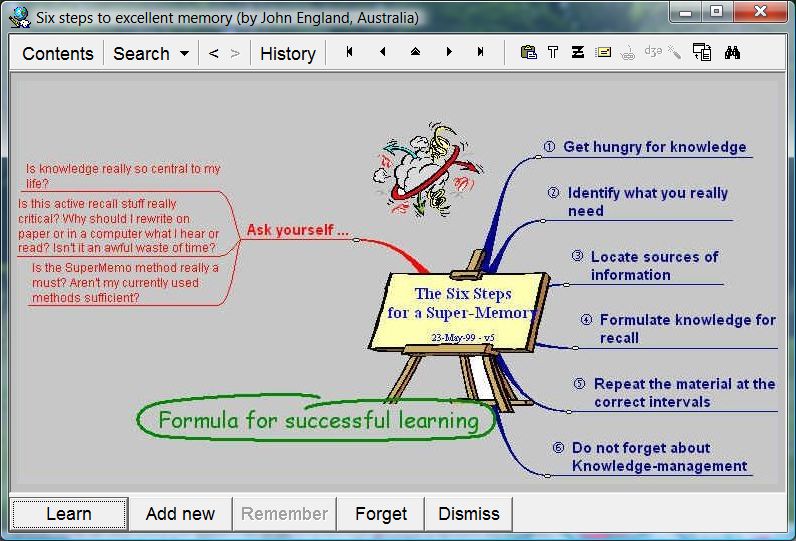Dr Piotr Wozniak, September, 1998
This article defines key points needed to build rock-solid knowledge for lifetime. Some points may be obvious to you, some may be new. Those which require further discussion provide links to further materials on this website and on the net. This article is also available in Simplified English: Six steps to excellent memory
If you have found this place in the vast cyberspace of the web, you are probably not the one to convince that knowledge is power, and that solutions to most problems facing humanity could be found if we were armed with more understanding of how the world works. While knowledge is power, information can be overpowering. An increasing proportion of the population suffers from Information Fatigue Syndrome, i.e. from stress related to being overwhelmed with an unmanageable glut of information.
This text introduces you to simple steps toward managing information and toward rock-solid knowledge. No cheap miracles. Just a clear and straight approach based on facts and science. Within the bounds of the possible.
I have been working on the problem of effective learning for 16 years now since, as a student of molecular biology, I first understood how I could greatly change the quality of all my actions were I able to improve the recall of what I studied for exams (and not only).
Now, I would like to share my experience with you for one major reason: I want to see more people enjoy the blessing of empowering knowledge. If we all could learn and understand more, the world would definitely look better for all of us. Although I represent a company that is involved in commercial distribution of software tools and material for enhanced learning, I guarantee that after going through my 20-minute course you will be armed to experience noticeable improvement in your learning ability without spending a penny!
You may find the first three points obvious. Please do not stop reading if this is the case.
This is the shortest path to empowering knowledge:
- Nurse your hunger for knowledge – if your motivation for getting knowledge is weak you can stop reading this text. The rest of my advice will not work. Your motivation cannot be shallow (like for passing an exam, showing off at a party, impressing the boss, etc.). You have to find the clear-cut link between knowledge and the value it brings to life. Do you like science programs? Are you interested in how your computer works? Do you surf the net looking for news? If the answer is yes, you are probably on the right track. Can you spend more than 30 minutes on a totally uncreative and non-intellectual activity (e.g. gossip, adult magazines, unadulterated laziness, etc.)? If yes, you may have a motivational problem. The hunger for knowledge grows as you get more educated (the more you know the more you know you don’t know). So there is an excellent remedy for poor motivation: learn more and see how it can impact your and others’ life. Research shows that strong motivation may actually count more than your IQ. Do not forget about your health! A strong body makes it easier to nurture a well motivated mind
- Determine what you really need to know – you must first clearly identify the areas of knowledge that are most likely to positively influence your future. You will not even be able to skim the surface of the world’s knowledge resources in your lifetime! The earlier you realize this the faster you will reach the point at which you will see that three well-selected pieces of knowledge may have the power to blast the entire shelf of ill-picked books. You must first see how much time you can spend on learning daily. Only a lucky few can afford to learn new things for more than an hour per day. If this is the case with you, the problem of knowledge selection is yet more burning. Take a long-term perspective. Do not get obsessed with learning just one subject, e.g. English, Excel or Economics! To assume a responsible position in society, you will need strong general knowledge on health, sociology, history, natural sciences, etc. Only those who can grasp the full picture are well positioned to be successful in their efforts
- Locate sources of information – unless you are in your student years, going through a collection of thick books may not be the best way to accomplish your goals. Limited time gives preference to an incremental approach. You can study lots of sources in parallel and pick only information of the highest priority. Have you discovered the power of the Internet? Lots of answers can now be found on the net (as this article: short, free, and, hopefully, making an impact). Obviously you should cast your net wide. TV, news magazines and the library are still irreplaceable in many areas. Read also about Incremental learning to find out about efficient strategies for collecting, prioritizing and processing knowledge from the web.
- Formulate knowledge for active recall – this is the first point on the list that will require some convincing. Effective learning must be based on repetition. Otherwise whatever you learn will sooner or later be forgotten. Do not trust theories which tell you that you can develop memories lasting for lifetime! Everything you remember for life is somehow rehearsed by your memory (even if you are not aware of the repetition). The concept of permastore (indelible memory) is true only if you understand it as long-lasting memories that reach beyond your expected lifespan. No acquired memories last for ever. Repetition is necessary to remember things.
An effective repetition must be based on active recall. This means that your brain must generate the answer. You cannot just passively process information. It is not enough to read that George Washington was the first US president. You need a question! For example: Who was the first US president? You will be disappointed to find out that most of the learning material available worldwide still does not comply with active recall! Additionally, whatever is based on active recall may not meet your expectations. Do you like running through exercises at the end of a course book? Probably not. The painful truth is that you will certainly have to formulate most of the knowledge yourself. After all, you will be getting it from various sources: CNN, Internet, Newsweek, encyclopedias, business journals, science journals, etc. These sources are not best suited for learning. They do not comply with the active recall principle. The time you invest in formulating knowledge for active recall will be returned manifold as long as you stick with the remaining principles of the presented formula for success in learning! (esp. Point 2: selecting only material that you need, and Point 5: repeating it in a rational manner). You will yet need lots of time to perfect the skill of adequately formulating knowledge for learning. You will find more details in The 20 rules of formulating knowledge in learning (including Tony Buzan’s mind maps, cloze deletion, handling enumerations, etc.) - Use spaced repetition (i.e. repeat the material in properly selected intervals of time) – this point is most likely to enhance your learning skills even if you are a seasoned student! As mentioned earlier, you must repeat the learned material to make sure it really remains in your memory. The most difficult problem to solve is how to properly select the timing of repetitions. This problem has been solved for you and is immediately available as the SuperMemo method of fast learning (the name SuperMemo is derived from super memory and has nothing to do with memos). You can start using SuperMemo in minutes. You have three options, two of which are free:
- you can read Using SuperMemo without a computer and start using the method today
- you can download older versions of SuperMemo freeware
- if you have a credit card, you can order SuperMemo in minutes (MS Windows and other platforms) Once you learn how to use SuperMemo, you will remain for ever free of worries about being or not being able to remember the knowledge you learn. In newer versions of SuperMemo software, you can even tell the computer what proportion of knowledge you want to retain in memory (between 90-99%)
- Do not neglect knowledge management – once you start learning using the previously mentioned principles, you must not forget that your needs change in the same way as the world around you. This fact must find its reflection in learning! Repetitions of the learned material must become a standard fixture in your daily schedule. This time will be spent well if you carefully make sure at each repetition that the material you learn is really worth the time you put in it. It must be up-to-date, useful, and properly formulated. You may be saving 70-90% of your time if you remove or reformulate the hardest 5% of your learning material! The newest version of SuperMemo makes it possible to reschedule, postpone, dismiss, reedit or simply delete all material whose place in the learning process is changing. For more information about effective learning based on active recall and SuperMemo read: Learning Decalog
You may be now skeptical of whether the above procedure is really worth the initial investment of time and adapting your mind to a new approach:
- Is knowledge really so central to my life?
- Is this active recall idea really critical? Why should I reformulate whatever I hear or read? Isn’t it an awful waste of time?
- Is the SuperMemo method really a must? Aren’t my currently used methods sufficient? Reading a 5-page article, searching for shareware or shelling out a couple of dollars might be barriers many of you will not be ready to pass! Sticking with regular repetitions may be an even steeper obstacle.
I have devoted all my academic and professional life to promoting the above approach and I guarantee results to anyone who will have the will to try and the persistence to continue. If you have any doubts, please do not hesitate and write with your questions.

(Six Steps mind map generated in Mind Manager 3.5, imported to SuperMemo, courtesy of John England, TeamLink Australia Pty Ltd)



